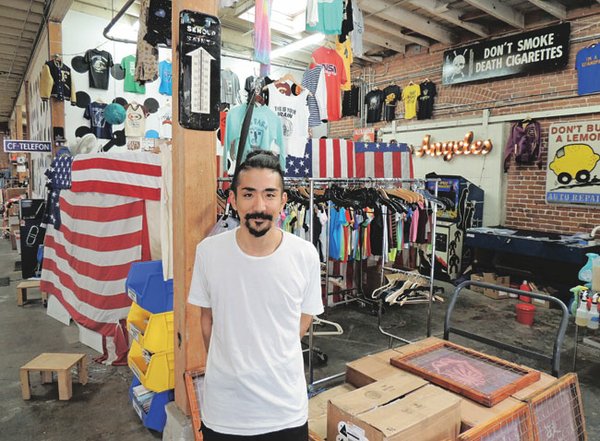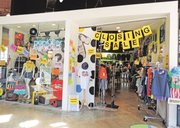NEW PLANS: After closing his Popkiller store in Costa Mesa, Ricky Takizawa, pictured above at his Los Angeles workshop, plans to introduce new businesses.
RETAIL
Tough Times in Retail Lead to Complex Ways to Thrive
After a decade of solid growth, Ricky Takizawa’s Popkiller chain of stores will experience its first big setback. Its long-running boutique at The Lab, an upscale and hip specialty retail center in Costa Mesa, Calif., is scheduled to close at the end of July.
For 11 years, the Japanese-born retailer has run a handful of Popkiller stores that sell vintage and new clothes as well as T-shirts with graphics inspired by Japanese and American pop culture. But hanging up a “Going Out of Business” sign at a hip retail center known for serving a well-to-do clientele has made Takizawa think it’s time to shuffle his business plan.
“We need to change something,” Takizawa said in his downtown Los Angeles creative workshop lined with road signs from the mid-20th century. “But we are going to keep our branding strong.”
Takizawa is one of hundreds of retailers—both independent and divisions of major companies—that are presented with a tough choice: shift gears or continue to be battered by a shaky economic recovery and shifting retail sands.
The past year has been particularly rough on retailers. In the action-sports market, Andy Mooney, Quiksilver Inc.’s chief executive officer, said during a recent conference call that in the past year 20 percent of his surfwear company’s retail partners in the United States went out of business.
One of those dealers was the Oceanside, Calif.–based chain K-5, which closed its three stores in 2013 after 25 years in business. There’s trouble for e-commerce sites, too. Footlocker Inc. announced on June 26 it would shutter skateboarding e-commerce emporium CCS, which it paid $102 million to acquire in 2008.
It’s tough across the board in the retail business, said Jeff Van Sinderen, a senior analyst with B.Riley & Co., a Los Angeles financial-services firm that follows the stock of several well-known teen and surf retail chains. “In my opinion, we are in a period of shakeout,” he said. “We’re in a weak apparel cycle. We will exit this, but we are in a period where some will not make it. It will also be a period of opportunity, and some will emerge stronger.”
Many factors are affecting retailers, Van Sinderen said. For stores that cater to teens, youth unemployment has led to lower store sales. Also, there are no macro-trends, such as the novelty colored jeans fad of a few years ago that inspired people to open their wallets and update their wardrobes. He also noted that retail is still restructuring. “We have this shift going in omnichannel and e-commerce,” he said. “Some smaller independents just don’t have the wherewithal to survive. It’s evolving so quickly.”
Big Retail Changes
Even if retailers have a website, the e-commerce market is becoming more complex, said Sarah Owen, an editor in the New York office of WGSN, a leading fashion-trend forecaster.
“Millennials [ages 14–34] are now redefining the consumption landscape and use online shopping as more of a discovery tool rather than to purchase items,” she said. “New technology has begun emerging for social platforms such as Instagram, which allow users to click through links by way of start-ups such as Liketoknow.it,” she said. “For retailers to stay ahead, they need to embrace new technology like this and also partner with start-ups that are pushing the envelope.”
In every market, some businesses succeed even during times of turbulence. But success varies from retailer to retailer. Retailers have suffered because many brands have not been doing enough to differentiate their product. Then there are companies such as Nike that offer products to different niche markets. These products are typically wholesaled to specialty retailers catering to that niche.
“They’re doing action sports, skateboarding, urban business with the Jordan brand—soccer, football. They’re making product for many different market segments. They support specialty retail,” said Aaron Levant, whose Agenda trade show hosts more than 750 streetwear and action-sports brands. ”But with our industry as a whole, action sports has not done as good a job influencing customers to buy in one place versus the other.”
Others argue e-commerce and niche products are not enough. Darren Gold, a retail consultant and owner of the Palm Springs, Calif.–based store Alpha, produces pop-up stores each year in top retail districts such as West Hollywood and Manhattan Beach, Calif.
“You have to be an events producer,” he said. “You have to constantly give people a reason to come to a store, which means events. Every week stores are producing book signings or a [product] demonstration. It is part of the game now.”
Retailers also need to capture consumers’ attention through social media, have great sales skills to close deals, find brands that are not in wide distribution, and be savvy enough to cut expenses and stretch dollars to operate a store.
“I don’t think one person can do all of that successfully,” Gold said. “You can get experts in those fields if you can afford outsourcing or you have to hire great salespeople. Salespeople can’t just be greeters and ring sales up anymore. They have to take it three to four steps further. It changes what you are looking for in your employees.”
For Takizawa, he plans to raise the ante with his company’s e-commerce offerings and also provide new services. This summer, his boutique, named Pop, in Los Angeles’ Little Tokyo district, will introduce a program for consumers to use a new in-store kiosk to customize T-shirts. After a consumer chooses the design, graphics and silhouette of a T-shirt, Takizawa’s company will assemble and deliver the shirt through various omnichannel options. He plans to open more Pop locations in the future.
Later this year, Takizawa also plans to debut Popfactory. The new concept will offer a creative hub for artists, businesses and others to work with Takizawa to make T-shirts, clothes and accessories. “The Popfactory project will help creative people,” he said.
He forecasts that Popfactory, which he hopes to expand, will appeal to a far wider demographic and become the main part of his business. Meanwhile, Popkiller, with its fleet of three stores, will continue its mission to sell vintage and new clothes.























